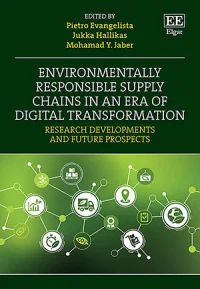Environmentally Responsible Supply Chains in an era of Digital Transformation
Date:
28 August 2024

The book Environmentally Responsible Supply Chains in an era of Digital Transformation: Research Developments and Future Prospects,edited by Dr Pietro Evangelista, research director at CNR-ISMed, Prof Jukka Hallikas and Prof Mohamad Y. Jaber, is now available.
More details on the book can be found here.
Abstract
The recent pandemic and wars in Ukraine and the Middle East caused significant problems on the supply side of goods and exacerbated volatility in demand. The economies of many countries as well as many companies may not recover quickly from the consequences of these events. There is therefore a need for more resilient international supply chains to improve responsiveness to market demands in times of uncertainty and volatility. Many of the digital technologies available today certainly help to make supply chains more resilient. However, the challenge for businesses is that the increased resilience of supply chains cannot be achieved if it is not accompanied by an adequate level of sustainability to cope with the scarcity of many natural resources, global warming, increased energy demand, energy supply difficulties and toxic waste recycling.
In this context, it is important to answer the following question: what contribution can digital technologies make to improve the sustainability of supply chains and thus their resilience?
Digital technologies such as artificial intelligence, big data, machine learning, the internet of things, additive manufacturing and printing, human-robot collaboration and blockchain, are enablers that facilitate the integration of the different levels in which a supply chain is organised to improve customer service and reduce costs. New digital technologies can therefore help to manage activities along supply chains in a more sustainable way as in the case of transport, where digital technologies provide a key contribution to mitigating the most pressing environmental problem, namely the reduction of CO2 emissions.
Although many researchers have shown significant interest in modelling these issues in the face of difficulty in capturing the complexities and interactions occurring in supply chains, there are still few scientific studies focusing on the integration of digitisation and sustainability in logistics and supply chain management. This book addresses this gap of the scientific literature by presenting original research that focuses on the links between digital technologies and environmental sustainability and how synergies can be created in supply chain management practices. It contains 14 chapters that can be divided into three different categories: theoretical/conceptual, investigations/experiments and applications/case studies. These studies were conducted by scholars and practitioners operating in different countries and continental areas who share findings and managerial insights on how digital technologies can make supply chains more sustainable. The book thus offers a comprehensive and up-to-date overview of this crucial topic and makes a significant contribution to increasing knowledge in this area.
Last update
30 January 2025, 12:27

 CNR – ISMed
CNR – ISMed